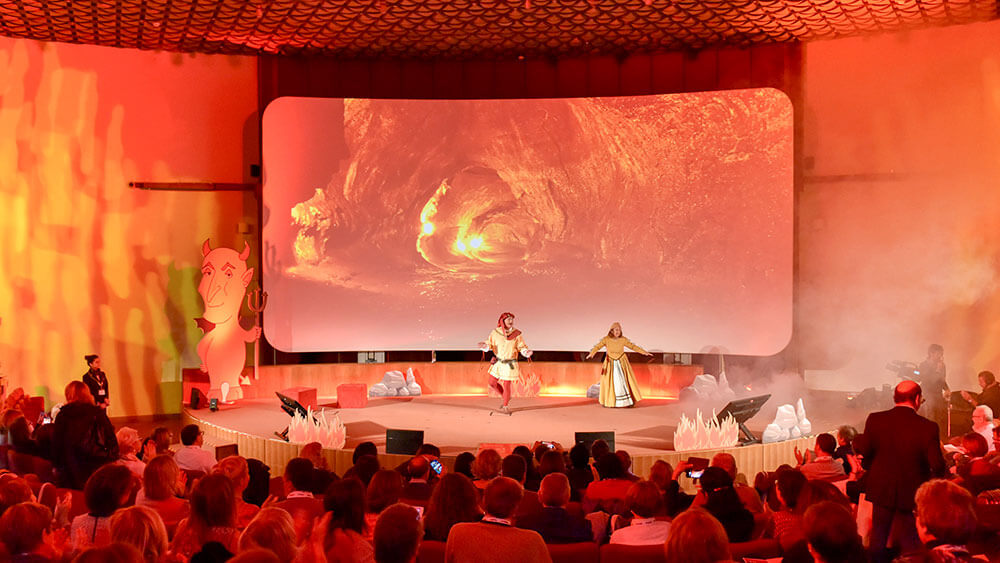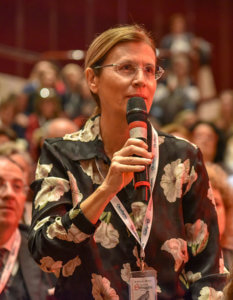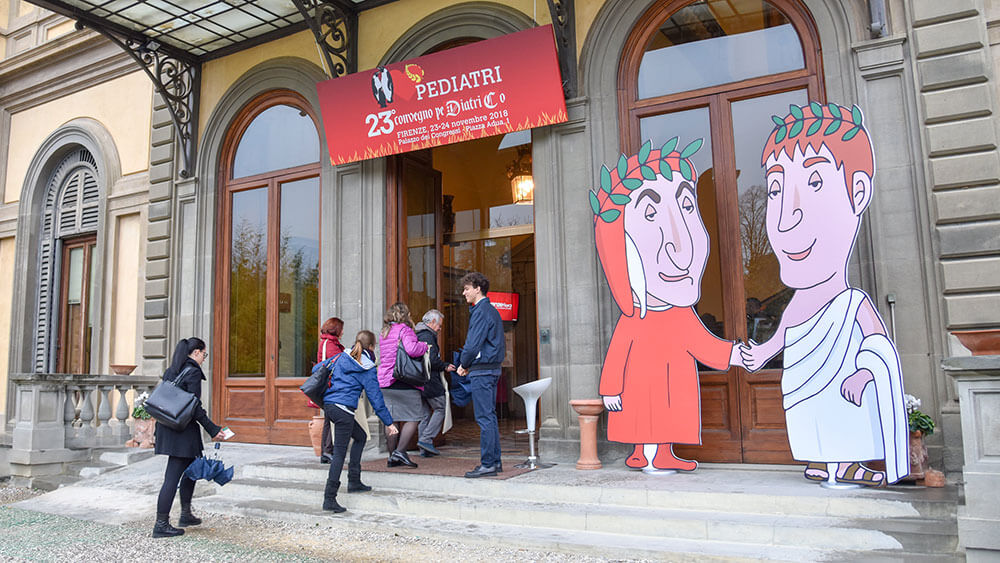
Co-presidents and co-founders Paolo Becherucci and Monica Pierattelli open the 23rd Pinguini Pediatric Congress dressed as characters from Dante’s “The Divine Comedy.” (Photos courtesy AIM Group)
This case study is part of Convene‘s April CMP Series story looking at innovations in scientific and medical meetings.
| 23rd Pinguini Pediatric Congress | ||
|---|---|---|
| Nov. 23-24, 2018 | Palazzo dei Congressi, Florence, Italy | 1,100-plus attendees |
Created by a small group of independent Italian physicians rather than a scientific association, the Pinguini Pediatric Congress has strived to deliver a more informal meeting that encourages open discussion among participants about the most common questions that arise during their daily outpatient practices.

Francesca Manzani
For the 23rd Pinguini Pediatric Congress, the organizers wanted to expand into a larger venue in Florence, Italy, with the hope of attracting for the first time more than 1,000 delegates — but they also wanted to maintain the high level of participation they’d achieved in the previous, smaller congresses.
Francesca Manzani, head of AIM Group International’s Florence office, managed the project. Working with the congress presidents who already were receptive to giving the congress a distinct personality, AIM Group borrowed a more creative, informal meeting style similar to some corporate conventions. Taking inspiration from one of Florence’s greatest masterpieces, “The Divine Comedy” — Dante’s long Italian poem, completed in 1320 — the AIM Group married the scientific knowledge of the congress to the host city, where art, literature, and culture are part of the city’s DNA.
“The Divine Comedy” showed up everywhere — in the congress’s visual identity, room setups, and scenic designs — to create an atmosphere that would involve participants emotionally as well as intellectually, Manzani told Convene via email. Each day of the conference was given a secondary theme that followed the book: Hell for the first day; Paradise for the second. During the opening ceremony, the congress’ co-presidents and co-founders, Paolo Becherucci and Monica Pierattelli, announced the event and welcomed participants — dressed in medieval garb and having emerged from a stage resembling Dante’s inferno.
Besides the entertainment aspect of the theme, organizers created multiple chances for attendees to interact in the conference, including in the plenary sessions. “The focus was on building a dynamic and open atmosphere and constantly encouraging interaction,” Manzani said.

The Dante theme sparked a lot of conversation and audience participation at the pediatric congress.
Some of the strategies used to create audience involvement during sessions included interactive sessions, which featured televoting systems, question-and-answer periods, requests for feedback, and more ideas. In addition, an actress portrayed a teen who is trapped in the wrong body to demonstrate gender dysphoria, which led to a more focused, passionate discussion among the speakers on the panel and the audience, Manzani said. Participants also were able to watch videos addressing specific clinical issues of everyday outpatient practice and at designated times speak with the “authors” of those videos, which helped facilitate one-on-one or small-group discussions about common clinical issues.
The 23rd Pinguini Pediatric Congress achieved its growth goal, convening more than 1,1000 attendees at the Palazzo dei Congressi in Florence — a 23-percent increase over the previous congress in 2017. According to AIM Group, attendee surveys suggested that “learning was never as powerful” than at the 2018 congress.
“Physicians are more keen to accept novelties than we usually think,” Manzani said. Getting as creative as AIM Group does with this annual meeting — the 24th Pinguini Pediatric Congress in 2019 took its inspiration from Italian author Carlo Collodi’s The Adventures of Pinocchio — could be perceived as “a bit of a stretch” in some cases, she said, because not every organization is the same.
But, she added, blending scientific content with other disciplines can work with any event. “When you make presentations more creative,” Manzani said, “attendees are more engaged.”
Curt Wagner is an associate editor at Convene.

“The Divine Comedy” theme was evident throughout the pediatric conference, tying in Florence’s culture.
Earn One Hour of CE Credit
By reading this case study and the others found in the April Convene cover story, you will be ready to earn one hour of CE credit toward CMP certification from the Events Industry Council. To take an online test to earn that CE credit.
